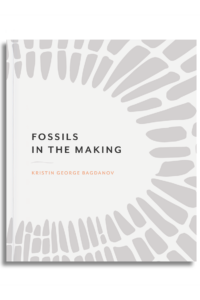by TEGAN DALY

Kristen George Bagdanov, Fossils in the Making (Black Ocean Press, 2019), pp. 112.
This review was originally published in the Winter 2021 print issue of Carolina Quarterly.
In her debut collection, Kristen George Bagdanov urges us through a labyrinth of compressed and physical language. Fossils in the Making lays out pathways for us to follow through the landscape of the body and its failings, rich with sonically satisfying language and energetic imagery. These poems move like a strong predator—practiced, precise, addressing mortality openly. Bagdanov, widely published for both critical and creative work, is a PhD candidate in English literature at the University of California, Davis, and holds an MFA in poetry from Colorado State University. Her strong grasp on the syntax and sound of the English language comes through clearly in her poetry.
Fossils in the Making dwells on the construction and destruction of the body—both the human body as an animal body, and the Earth as a collective body. It asks us to consider our transience as living beings, the inevitability of our endings, and the fragility of our construction. In “Proof of Extension” she writes:
“I was a knowing thing I trusted my body
the apparatus of truth Don’t say such things
and expect anyone to believe you
says my body Don’t say just think
through the quiet death and regeneration of mitochondria
through the calculus of glucose that roots for our survival
though the million billion parts that do not make a whole
that do but do not produce the sum of this body”
With this precise language, Badanov attempts to reconcile the complexity of the human experience with the fact that we are flesh and blood, tied to our biology as much as any other living thing. She uses several tactics in her poetry to further challenge readers to consider what they may be taking for granted. Through the use of homonyms, poetic structures that allow for multiple meanings, and repetition of words with similar sounds and dissimilar meanings (carcass/caress) she creates an intentional level of discordance in her work. She experiments with form, line length, and white space to cause us to question how we process information. In poems such as “Earth,” the lines are crafted to force readers to hold multiple interpretations in their mind at once:
“world
This is the that ends in inches
self
that regards the and cringes
body”
At first, this structure is disorienting, but through its appearance in many poems, Bagdanov trains readers to look for various interpretations and double meanings in her writing. We become attuned to her expression of the complexity of moving through the world as physical, as well as thinking beings, not only through the literal meaning of her words, but through their arrangement and juxtaposition on the page.
The structure of the collection itself is also carefully crafted by Bagdanov to encourage readers to consider actions and transactions, consequences and fallout. Fossils in the Making is divided into three parts: “Proofs,” “Wagers,” and “Remains,” with a single poem, “Lines Written After Crisis” preceding them. The poems in “Proofs” seem to adhere to the logic of a mathematical proof: “If x, than y.” Often they proceed down the page expansively, followed by a contraction back to where they began, as in “Proof of Harm,” which opens with the wrenching image: “This one measures tidal flux against plastic gyre”—a boat passing through trash in the ocean and the resulting “floating bodies in animal fashion.” The following stanzas also open with a measurement and the closing image brings us back to “bodies knocking against a hull.” There is a logical and clinical progression through the poem, as in many of the others throughout the “Proofs” section.
In contrast to “Proofs,” “Wagers” reads as a deep dive into obsessive thought revolving around embodiment and a speaker grappling with the limitations of physicality. “My body would not hold what I had asked— / neither would it let go.” The reality of death as a requisite of life permeates this section as the speaker ruminates on the inadequacy of physical bodies, cycling back repeatedly to the statement: “I asked for another body once.” The obsessive nature of this section invokes a sense of the speaker trying desperately to figure something out, to crack some sort of code through repeated trial and error.
The final section, “Remains,” ranges back out front the interiority of “Wagers” to a sort of cataloging of conclusions drawn from earlier ideas. The poems of this section vary greatly in structure, but seem to hold a somewhat cohesive voice. There is a resignation to this section. If earlier poems served as the forming of a hypothesis, “Remains” is the dire findings of the research. The section explores the ecological disasters of our own making with an eerie matter-of-factness.

Throughout each of the three sections, Badanov uses anaphora and slant rhyme to create an almost incantatory effect in many poems including the untitled poem which occupies its own section called “Wagers.” These repetitions of lines, words, and sounds pull readers through the poems. Bagdanov is aware that, as readers, we will begin to seek patterns in the work and she delivers these repetitions and variations just as we begin to anticipate them. However, the poems avoid falling into predictability as there is a different sort of satisfaction when the spells the patterns create are finally broken with intentionality on Bagdanov’s part. Beyond the use of anaphora in individual poems, she takes this technique a step further and inserts echoes of lines and ideas from previous poems. In “animal / flesh” she writes: “We come together at night to pretend / loneliness is an animal we can cull. I / watch you sleep, hair splayed across your pillow, / slack mouth breathing for your singular life.” These lines harken back to “Wagers” when she delves into a similar theme:
“In the darkness we touch our animal bodies
repeatedly we try to breach our limits
We will die trying: peeling back the layers of body
trying to hear what else there is”
Themes and words resurface throughout the collection, bringing us back to an awareness of mortality and our daily forgetfulness of this condition of existence.
The book opens with an epigraph from Lorinne Niedecker’s “Lake Superior,” which is strikingly fitting, as many of Bagdanov’s tight, condensed poems emulate Niedecker’s ability to cut away everything that is not essential from a poem. This technique directs our attention with laser focus. There are no distractions from what is at stake. Similarly, the technique of echoing lines and words from previous poems reminds one of Niedecker. A beautiful example of this condensed, yet impactful language appears in the final lines of “tree / trace” when Bagdanov writes:
“Close your eyes and a season will pass before you
had you the century’s gaze
of a coast live oak
It will not survive this, either
It sheds bark
breaks branch
Lovers’ carved symbols seeping their wound of sap”
These lines, as well as the endings of many of the poems in Fossils in the Making leave us feeling unsettled. The collection causes us to feel as though we were on the edge of catastrophe, biding time as we go about our daily lives—it returns not only to our mortality as individuals, but to our collective mortality as residents of a planet in distress. Poems like “Proof of Infinity,” “warn / warming,” and the penultimate poem “fossils / making” pan out from the speaker’s body, to humanity as a whole, to other living creatures, and the Earth as an entity in itself. The poems move between both the urgency and complacency of living in a world which is being destroyed by our way of life.
While many of the poems in Fossils in the Making revolve around the interiority of a speaker using the “I” pronoun, many of them expand outward to an “I” who is aware of being part of something bigger. These poems serve to drive home the understanding that it is not only the “I” who is limited by mortality. In “fossils / making,” she writes:
“… Dump
a few thousand
gallons & watch
them dissipate
then resurface in
gills & wings of
animals both like
& unlike me, next
to but not near
-
-
- Do not ask
-
the unborn for
absolution. They
can only give you
what you leave.”
This sentiment is an apt takeaway from the collection, which asks us to be accountable for the repercussions of our way of life. Our self-serving rough treatment of ecosystems which are inherently fragile and destroyable.
Fossils in the Making addresses polar issues of mortality and what remains after death, existence and its effects on others and on the world, isolation and desire for connection. Bagdanov navigates between the experience of these opposing subject matters, allowing them to exist on the page, not in contradiction of each other, but in symbiosis. Her poetry utilizes direct and concise language, carefully selected words and structures. The collection is a compelling memento mori, unafraid to examine the complexity of living as creatures aware of the inevitability of our own death, and of the death caused by our existence.

